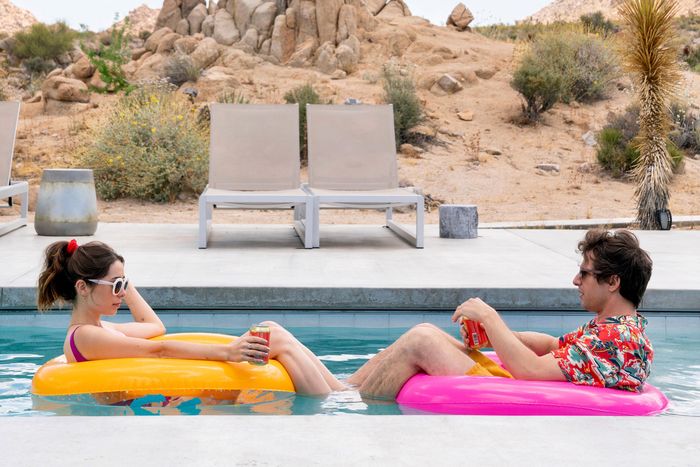
Harold Ramis didn’t set out to make a religious parable when he directed 1993’s Groundhog Day. Viewers from Buddhists to Jesuit priests, however, have claimed to see aspects of their faiths reflected in its story of a man doomed to live the same day over and over. The journey of Phil Connors, asshole weatherman, really is a kind of nondenominational spiritual rebirth that takes him from liberation to despair to generosity. (His periodic havoc-wreaking and attempts to get laid just enhance the experience.) Groundhog Day didn’t invent the temporal loop, but it did cement the concept in American pop culture as a multipurpose limbo, and the idea of a character who improves by being passed repeatedly through the same stretch of time, like water through a Brita filter, has turned out to be a malleable one: Natasha Lyonne was taught the value of human connection after countless birthdays in Russian Doll; Tom Cruise learned to be a better action hero by rerunning battles and dying over and over again in Edge of Tomorrow. The template is now familiar enough that a main character in the new movie Palm Springs can sum up the premise with a desultory shorthand: “It’s one of those infinite time-loop situations you might have heard about,” he says, trailing off questioningly. No further explanation needed.
Palm Springs is the absurdly charming narrative-feature debut of director Max Barbakow and writer Andy Siara, and it is indeed another exploration of what it’s like to be stuck in a moment you can’t get out of. But one of its immediate pleasures comes in how dexterously it skims past many of the obligatory beats in order to get to less-explored territory. It’s not that Sarah (Cristin Milioti), a recalcitrant maid of honor at her sister’s destination wedding, isn’t shaken to find herself returned to the start of her day after a strange encounter with a mysterious cave in the desert. It’s just that Nyles (Andy Samberg), the man she follows into the cave after a hookup goes horribly awry, has been dealing with their now-shared situation for longer than he cares to divulge. Sarah wants to drive all night until she has escaped back home to Austin? Nyles has already traveled much farther and found it a wasted effort. Sarah opts to steer the car straight into the path of an oncoming semi in hopes that death will provide an escape? Nyles unbuckles his seat belt and informs her he’ll see her in the morning. Cycles of panic and denial are dispatched in record time until what remains are two emotionally skittish people trapped together on November 9 for a possible eternity. What’s left for them to do but fall in love?
Honestly, a fair amount, including a choreographed dance number. For one especially giddy stint in the middle of the film, the stranded pair take advantage of the fact that nothing they do matters, and the sequence manages to be both more adventurous and less dark than you might expect. Sarah (in her own words) “fucks around and drinks too much,” while Nyles is an apocalyptic variation on the exuberantly immature goofballs Samberg always plays, but they’re still fundamentally nice people. The Hello Kitty–cute chemistry between Milioti and Samberg would verge on cloying if a few obvious revelations weren’t waiting in the wings to fuck things up. Palm Springs is a romantic comedy, but its central question is less whether these two characters will get together than whether they’ll be able to build a future for themselves. The endlessly resetting day becomes a metaphor for a relationship in its early stages, when it’s all fun and none of the hard stuff. Nyles has achieved an equilibrium that looks Zen from afar but turns out to be a means of emotional avoidance and self-protection. Sarah harbors serious tendencies toward self-sabotage, but she’s willing to try to change and move forward.
All of this makes Palm Springs, at its core, something a little discouragingly conventional under the cleverly executed high concept — a movie about a woman waiting for a man to grow up enough to commit. The characters meet as cynics feeling alienated by the spectacle of matrimony, though they’re hardly removed from the straightforward hetero monogamy they roll their eyes at. Still, the film is too quick on its feet and too eager to please to begrudge it that eventual turn. Palm Springs is the latest project from the Lonely Island, the comedy troupe turned production company Samberg runs with Akiva Schaffer and Jorma Taccone. While the trio didn’t write or direct this film, it owes a lot to their sensibility, especially in knowing when to cut away from a joke. It may be about characters who have all the time in the world, but it’s painstakingly careful not to overstay its own welcome, generously divvying up funny scenes to a supporting cast filled with talent like J. K. Simmons, Meredith Hagner, Dale Dickey, and Peter Gallagher. Palm Springs would have been a scream and likely a word-of-mouth hit in theaters, but maybe there’s something fitting about its going straight to streaming in the middle of a pandemic. What is quarantine, anyway, if not waking up and going through the same routine over and over without end?
*This article appears in the July 6, 2020, issue of New York Magazine. Subscribe Now!
More Movie Reviews
- The Accountant 2 Can Not Be Taken Seriously
- Another Simple Favor Is So Fun, Until It Gets So Dumb
- Errol Morris Has Been Sucked Into the Gaping Maw of True Crime


